|
|
|---|
The Mermen- A Glorious Lethal Euphoria (1995)- EAC CD Rip (FLAC)

A few months back I was looking for some lossless Shark Quest (the band that did the music for Monster Road), and I realized how much they reminded me of The Mermen. I still need to keep looking for more Shark Quest, but hopefully the person who liked Shark Quest will enjoy this.
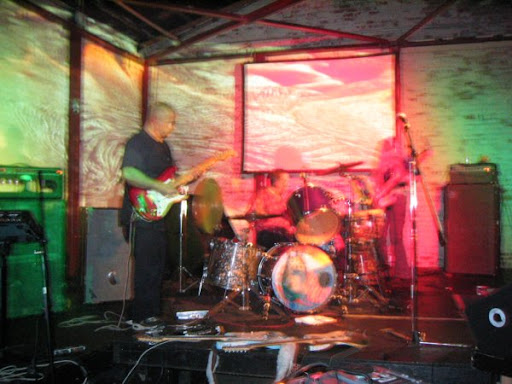
From David Dudley at New Times:
Ferocious and haunting instrumentals of an almost orchestral density. Whether roaring through lethal little string-benders such as 'Pulpin Line' and the punkish 'Drub' or riding the mesmerizing waves of feedback and melody on...epics such as 'Obsession for Men' and 'Between I and Thou,' the Mermen never collapse into surf kitsch or fall back on the genres beloved but overfamiliar cliches...'The Drowning Man Knows His God'...mutates into a complex descending riff of barely restrained dread and finally wipes out in a squall of doomy guitar noise...The burbling underwater atmospherics...and the shimmering riffs...disguise intricate arrangements, and the muted arpeggios and grandiose leanings are a long way from Wipe Out.
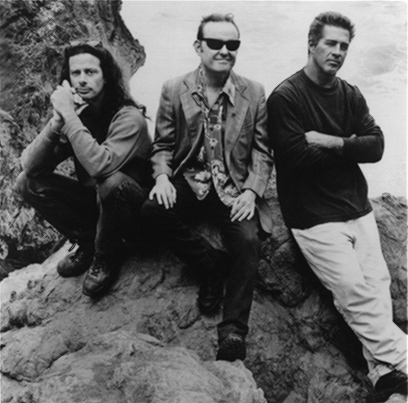
Technical Information:
Artist: The Mermen
Album: A Glorious Lethal Euphoria
Year: 1995
Audio Codec(s): FLAC
Encoding: Lossless
Rip: EAC split tracks + .cue
Avg. bitrate: 812 kb/s
Sample rate: 44100 Hz
Bits per sample: 16
Channels: 2
File size: 429 MB
Length: 1:13:51
Tracklisting:
01. Pulpin' Line (3:58)
02. With No Definite Future and No Purpose Other than to Prevail Somehow... (4:27)
03. The Drowning Man Knows His God (3:33)
04. Scalp Salad (3:53)
05. Obsession for Men (9:23)
06. Blue Xoam (4:10)
07. Under the Kou Tree (5:42)
08. Lizards (3:57)
09. Quo me cunque rapit tempestas, deforor hospes (5:15)
10. Drub (3:22)
11. The Intractable Boy (4:28)
12. Between I and Thou (9:17)
13. And the Flowers They'll Bloom (9:49)
14. Brahms 3rd Movement 3rd Symphony (2:39)
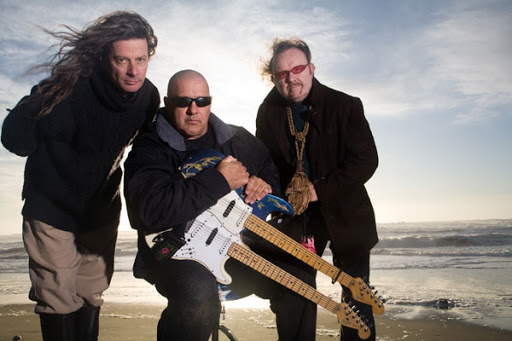
A Glorious Lethal Euphoria Megaupload Link
Labels:
lossless cd,
music,
the mermen
Thoughts on the NBA Playoffs
I was admittedly sad when my team, the Jazz, didn't make it to the playoffs this year, but after what has happened in the first round I'm not that sad anymore. The 2011 Playoffs have been wildly entertaining, dramatic and surprising to watch. Even though no series went all seven games, the quality of play has been high and most of the games have come down to the wire. Let's recap a few of the highlights, shall we?
LAKERS/HORNETS
In the series I most hoped for an upset, Chris Paul reemerged as a true star, willing the seventh seeded Hornets to the brink of defeating the defending champs. Alas, for me and other Laker haters, it was not to be. However, there were great moments in this series like when Paul and his boys stole game one in L.A., or when my least favorite player, Pau Gasol all but vanished and Phil Jackson called the team 'punks.' I also loved the moment when Chris Paul took a shot to the eye, and kept playing despite looking like Rocky Balboa. This series was almost perfect, I say almost because Kobe and Co. are still alive, but after tangling with New Orleans they might not have enough juice to make it back to the Finals. Let's hope.
BULLS/PACERS
Derrick Rose is the MVP. That is what we can take away from this series. If he plays poorly, the Bulls don't look very good. Luckily, he played well enough to take out Indiana in 5 games. Four of the five were too close for comfort, and probably left everyone wondering if the league's new darlings have enough to get to the Finals. I don't think they do, especially since Carlos Boozer is doing his usual playoff disappearing act, and Tom Thibadou seems reluctant to use the best bench in the league. Perhaps this series was just a hiccup and the Bulls will right the ship. They better, because what I think is the hottest team in the playoffs, the Hawks, won't miss an opportunity in a close game like the Pacers did.
CELTICS/KNICKS
The oldest team that needed the most rest got it by sweeping the most overrated team in the playoffs. New York stunk and got roundly throttled by a team that looks hungry, complete and dangerous. Boston, despite their advanced age, is my pick out of the East because they play together and know the territory well. They will need every bit of the rest they earned against the Heat, led by those three guys.
SPURS/GRIZZLIES
We saw an era end when Memphis upset the number one seeded Spurs in six games. The series wasn't even that close as the younger, quicker, bigger and hungrier Grizzlies mauled the crap out of the aging former champs. It was kind of sad to see, but all things come to an end. Who knows what lies ahead for San Antonio? I know what lies ahead for Memphis, a date with Kevin Durant and the Thunder, who are my pick to come out of the West.
Here now are my picks for the rest of the way-
LAKERS over MAVERICKS in 6
THUNDER over GRIZZLIES in 5
CELTICS over HEAT in 6
BULLS over HAWKS in 6
CELTICS over BULLS in 6
THUNDER over LAKERS in 7
CELTICS over THUNDER in 6
Labels:
Basketball,
Musings,
Utah Jazz
Sam Peckinpah- The Wild Bunch (1969)- Director's Cut- BluRay Rip (1080p-x264)

I was going to go on about Peckipah, William Holden, Robert Ryan, Warren Oates, Ben Johnson, etc., etc.,...but know it's all about the beautiful Mexican señorita's. *Aye yai yai!* Think of all the bullet and knife wounds as a break from Reiko Ike and Miki Sugimoto's breasts. Enjoy!

From Roger Ebert:
In an early scene of "The Wild Bunch," the bunch rides into town past a crowd of children who are gathered with excitement around their game. They have trapped some scorpions and are watching them being tortured by ants. The eyes of Pike (William Holden), leader of the bunch, briefly meet the eyes of one of the children. Later in the film, a member of the bunch named Angel is captured by Mexican rebels, and dragged around the town square behind one of the first automobiles anyone there has seen. Children run after the car, laughing. Near the end of the film, Pike is shot by a little boy who gets his hands on a gun.
The message here is not subtle, but then Sam Peckinpah was not a subtle director, preferring bold images to small points. It is that the mantle of violence is passing from the old professionals like Pike and his bunch, who operate according to a code, into the hands of a new generation that learns to kill more impersonally, as a game, or with machines.
The movie takes place in 1913, on the eve of World War I. "We gotta start thinking beyond our guns," one of the bunch observes. "Those days are closing fast." And another, looking at the newfangled auto, says, "they're gonna use them in the war, they say." It is not a war that would have meaning within his intensely individual frame of reference; he knows loyalty to his bunch, and senses it is the end of his era.
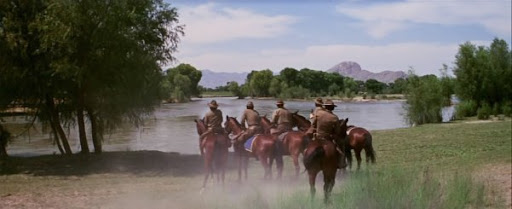
The video versions of "The Wild Bunch," restored to its original running time of 144 minutes, include several scenes not widely seen since the movie had its world premiere in 1969. Most of them fill in details from the earlier life of Pike, including his guilt over betraying Thornton (Robert Ryan), who was once a member of the bunch but is now leading the posse of bounty hunters on their trail. Without these scenes, the movie seems more empty and existential, as if Pike and his men seek death after reaching the end of the trail. With them, Pike's actions are more motivated: He feels unsure of himself and the role he plays. I saw the original version at the world premiere in 1969, during the golden age of the junket, when Warner Bros. screened five of its new films in the Bahamas for 450 critics and reporters. It was party time, and not the right venue for what became one of the most controversial films of its time--praised and condemned with equal vehemence, like "Pulp Fiction." At a press conference the morning after the premiere, Holden and Peckinpah hid behind dark glasses and deep scowls; it was rumored that Holden had been appalled when he saw the film. After a reporter from the Reader's Digest got up to ask "Why was this film ever made?" I stood up and called it a masterpiece; I felt, then and now, that "The Wild Bunch" is one of the great defining moments of modern movies.
But no one saw the 144-minute version for many years. It was cut, not because of violence (only quiet scenes were removed), but because it was too long to be shown three times in an evening. It was successful, but it was read as a celebration of compulsive, mindless violence; see the uncut version, and you get a better idea of what Peckinpah was driving at.
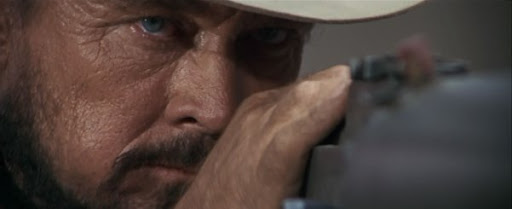
The movie is, first of all, about old and worn men. Holden and his fellow actors (Ernest Borgnine, Warren Oates, Edmund O'Brien, Ben Johnson and the wonderful Robert Ryan) look lined and bone-tired. They have been making a living by crime for many years, and although Ryan is now hired by the law, it is only under threat that he will return to jail if he doesn't capture the bunch. The men provided to him by a railroad mogul are shifty and unreliable; they don't understand the code of the bunch.
And what is that code? It's not very pleasant. It says that you stand by your friends and against the world, that you wrest a criminal living from the banks, the railroads and the other places where the money is, and that while you don't shoot at civilians unnecessarily, it is best if they don't get in the way.
The two great violent set-pieces in the movie involve a lot of civilians. One comes through a botched bank robbery at the beginning of the film, and the other comes at the end, where Pike looks at Angel's body being dragged through the square, and says "God, I hate to see that," and then later walks into a bordello and says "Let's go," and everybody knows what he means, and they walk out and begin the suicidal showdown with the heavily-armed rebels. Lots of bystanders are killed in both sequences (one of the bunch picks a scrap from a woman's dress off of his boot), but there is also cheap sentimentality, as when Pike gives gold to a prostitute with a child, before walking out to die.

In between the action sequences (which also include the famous scene where a bridge is bombed out from beneath mounted soldiers), there is time for the male bonding that Peckinpah celebrated in most of his films. His men shoot, screw, drink, and ride horses. The quiet moments, with the firelight and the sad songs on the guitar and the sweet tender prostitutes, are like daydreams, with no standing in the bunch's real world. This is not the kind of film that would likely be made today, but it represents its set of sad, empty values with real poetry.
The undercurrent of the action in "The Wild Bunch" is the sheer meaninglessness of it all. The first bank robbery nets only a bag of iron washers--"a dollar's worth of steel holes." The train robbery is well-planned, but the bunch cannot hold onto their takings. And at the end, after the bloodshed, when the Robert Ryan character sits for hours outside the gate of the compound, just thinking, there is the payoff: A new gang is getting together, to see what jobs might be left to do. With a wry smile he gets up to join them. There is nothing else to do, not for a man with his background.
Seeing this restored version is like understanding the film at last. The missing pieces flesh out the characters. It is all there: Why Pike limps, what passed between Pike and Thornton in the old days, why Pike seems tortured by his thoughts and memories. Now, when we watch Ryan, as Thornton, sitting outside the gate and thinking, we know what he is remembering. It makes all the difference in the world.

The movie was photographed by Lucien Ballard, in dusty reds and golds and browns and shadows. The editing, by Lou Lombardo, uses slow motion to draw the violent scenes out into meditations on themselves. Every actor was perfectly cast to play exactly what he could play; even the small roles need no explanation. Peckinpah possibly identified with the wild bunch. Like them, he was an obsolete, violent, hard-drinking misfit with his own code, and did not fit easily into the new world of automobiles, and Hollywood studios.
Sam Peckinpah (1925-1984) was a Marine in World War II, apprenticed in Hollywood under the action director Don Siegel, and did more than anyone else to bring the traditional Western into the gloom of a modern, ironic age. He was an iconoclast, warred with the studios, was often drunk, fought even with his actors, but achieved in "The Wild Bunch" and "Bring Me the Head of Alfredo Garcia" (1974) a fusion of the Western myth and the existential hero. I met him twice, once on the set of "Pat Garrett and Billy the Kid" (1973), once in a hotel room when he was touring to publicize "Alfredo Garcia," which then and now was not seen as the great film it is. Both times he seemed tremulous, and I had the impression of almost uncontrollable discomfort. He was clearly drunk (on the set in Mexico, he sat on a chair in the sun, shielded by an umbrellas, hat, dark glasses, relaying instructions to his assistant director). I cannot pretend to know what he was thinking, but I look at the films and I surmise that they represent a continuing parable about a professional doing what he does well in the face of personal and professional agony. Certainly that is a theme of "The Wild Bunch."

Technical Information:
Title: The Wild Bunch (Director's Cut)
Year: 1969
Country: USA
Director: sam Peckinpah
Source: Retail DVD
Video Codec: 1080p x264
Container: .mkv
Size: 10.9 GB
Length: 2:24:49
Programs used: mkvmerge
Resolution: 1920x784
Aspect Ratio: 2.40:1
Video: MPEG4 AVC H264 @ ~10800 kb/s
Frame Rate: 23.976 fps
Audio: English- Dolby AC3 5.1 Surround @ 640 kb/s
Subtitles: English, Sewdish, Danish, Finnish, Norwegian, Dutch, French, Italian, German
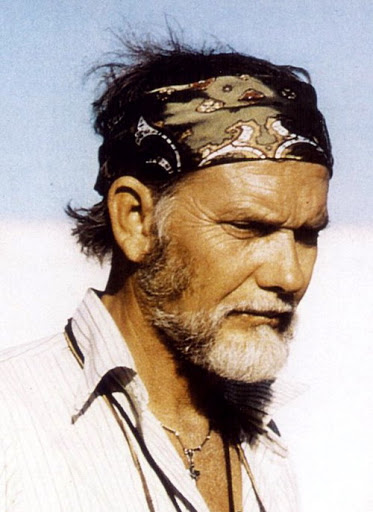
(Our prefered x264 player is Media Player Classic.)
(Use JDownloader to automate downloading)
The Wild Bunch Megaupload Links
Labels:
bluray movie,
movies,
sam peckinpah
Subscribe to:
Comments (Atom)













































